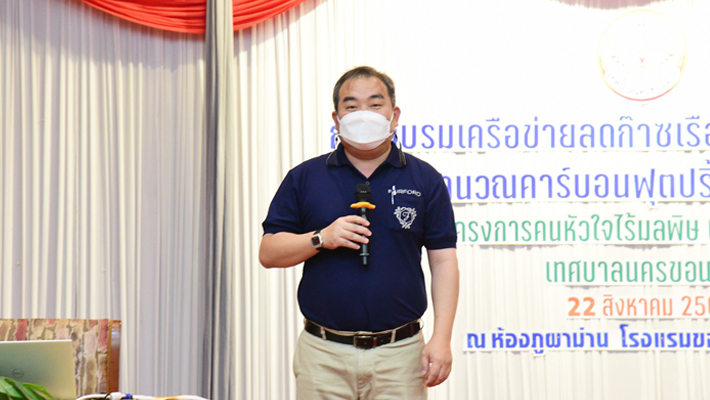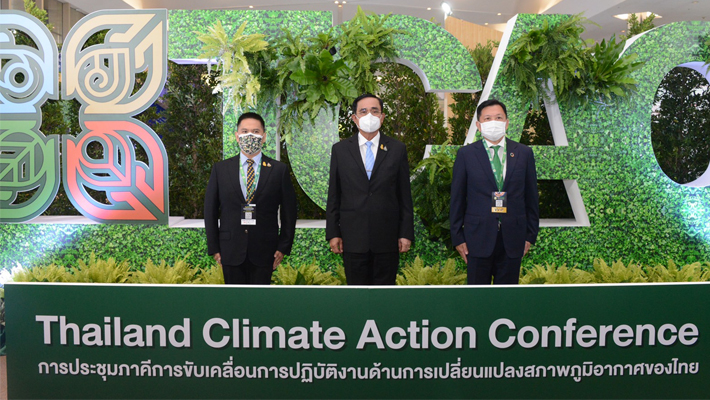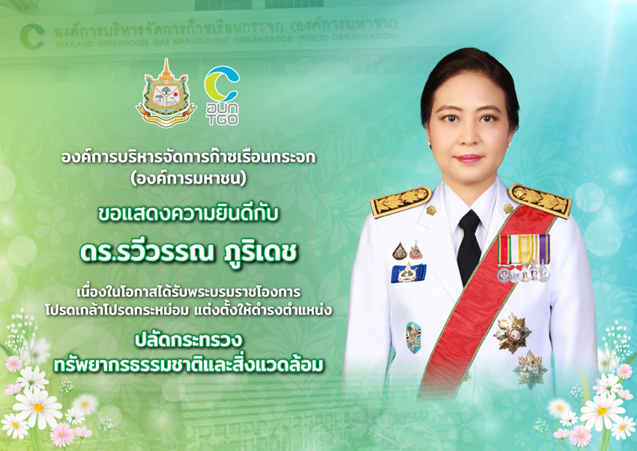Low-Carbon Organization under CoolMode Clothing Scheme to combating climate change
Thailand Greenhouse Gas Management Organization (Public Organization), or TGO, corporately with Thailand Textile Institute, held the seminar “Low-Carbon Organization under CoolMode Clothing Scheme” in order to recognize their contributions in combating climate change by Coolmode clothing utilization.
(February 14, 2020) Bangkok: Ms. Prasertsuk Patoonsittichai, executive director of Thailand Greenhouse Gas Management Organization (Public Organization), revealed that TGO has missions to promote and enhance greenhouse gas mitigation management to all stakeholders benefiting in economic, social and environment aspects of Thailand. Several relevant partnerships also jointly encourage the management and determination on evaluation approach of effective and participated greenhouse gas mitigation.
TGO has developed 3 carbon labels; (a) Carbon Footprint of Products (CFP) label; (b) Carbon Footprint Reductions (CFR) label; and (c) CoolMode label. The Coolmode label approves for clothing that promote of textile materials development and the design of garments, especially corporate wear, that are appropriate for hot climate and give comfort to a person wearing it in a building at 25 degree Celsius will reduce the electricity use for air conditioning, as well as directly and indirectly decrease the GHG emission.CoolMode clothing scheme delivers more options for consumers to select clothing that reduces GHG emission while encouraging the climate-conscious among the producers and textile market in Thailand.
Since fiscal year 2009, 141 textile structures from 32 companies have been approved by CoolMode label and more than 130 companies utilizing these textiles for clothing for their activities. At the CoolMode Award Ceremony 2019, 31 organizations; Tobacco Authority of Thailand, Bangkok Bank, Muang Thai Life Assurance, Bangkok Hospital, Dtac, Pathumwan Princess Hotel, IRPC, etc. This leads to more advancements and enhancements to all stakeholders to participate in greenhouse gas mitigation as well as crucial integrated measures for sustainable production and consumption; environmental impacts mitigation and low-carbon society.



![[image_name]](http://www.tgo.or.th/2020/file_managers/uploads/file_managers/source/News/2563-2-14%20%E0%B8%AD%E0%B8%87%E0%B8%84%E0%B9%8C%E0%B8%81%E0%B8%A3%E0%B8%A5%E0%B8%94%E0%B9%82%E0%B8%A5%E0%B8%81%E0%B8%A3%E0%B9%89%E0%B8%AD%E0%B8%99%20%E0%B8%94%E0%B9%89%E0%B8%A7%E0%B8%A2%E0%B8%81%E0%B8%B2%E0%B8%A3%E0%B9%83%E0%B8%8A%E0%B9%89%E0%B9%80%E0%B8%AA%E0%B8%B7%E0%B9%89%E0%B8%AD%E0%B8%9C%E0%B9%89%E0%B8%B2%20CoolMode/%E0%B8%87%E0%B8%B2%E0%B8%99%20CoolMode%202563_1.jpg)
![[image_name]](http://www.tgo.or.th/2020/file_managers/uploads/file_managers/source/News/2563-2-14%20%E0%B8%AD%E0%B8%87%E0%B8%84%E0%B9%8C%E0%B8%81%E0%B8%A3%E0%B8%A5%E0%B8%94%E0%B9%82%E0%B8%A5%E0%B8%81%E0%B8%A3%E0%B9%89%E0%B8%AD%E0%B8%99%20%E0%B8%94%E0%B9%89%E0%B8%A7%E0%B8%A2%E0%B8%81%E0%B8%B2%E0%B8%A3%E0%B9%83%E0%B8%8A%E0%B9%89%E0%B9%80%E0%B8%AA%E0%B8%B7%E0%B9%89%E0%B8%AD%E0%B8%9C%E0%B9%89%E0%B8%B2%20CoolMode/%E0%B8%87%E0%B8%B2%E0%B8%99%20CoolMode%202563_2.jpg)
![[image_name]](http://www.tgo.or.th/2020/file_managers/uploads/file_managers/source/News/2563-2-14%20%E0%B8%AD%E0%B8%87%E0%B8%84%E0%B9%8C%E0%B8%81%E0%B8%A3%E0%B8%A5%E0%B8%94%E0%B9%82%E0%B8%A5%E0%B8%81%E0%B8%A3%E0%B9%89%E0%B8%AD%E0%B8%99%20%E0%B8%94%E0%B9%89%E0%B8%A7%E0%B8%A2%E0%B8%81%E0%B8%B2%E0%B8%A3%E0%B9%83%E0%B8%8A%E0%B9%89%E0%B9%80%E0%B8%AA%E0%B8%B7%E0%B9%89%E0%B8%AD%E0%B8%9C%E0%B9%89%E0%B8%B2%20CoolMode/%E0%B8%87%E0%B8%B2%E0%B8%99%20CoolMode%202563_3.jpg)
![[image_name]](http://www.tgo.or.th/2020/file_managers/uploads/file_managers/source/News/2563-2-14%20%E0%B8%AD%E0%B8%87%E0%B8%84%E0%B9%8C%E0%B8%81%E0%B8%A3%E0%B8%A5%E0%B8%94%E0%B9%82%E0%B8%A5%E0%B8%81%E0%B8%A3%E0%B9%89%E0%B8%AD%E0%B8%99%20%E0%B8%94%E0%B9%89%E0%B8%A7%E0%B8%A2%E0%B8%81%E0%B8%B2%E0%B8%A3%E0%B9%83%E0%B8%8A%E0%B9%89%E0%B9%80%E0%B8%AA%E0%B8%B7%E0%B9%89%E0%B8%AD%E0%B8%9C%E0%B9%89%E0%B8%B2%20CoolMode/%E0%B8%87%E0%B8%B2%E0%B8%99%20CoolMode%202563_4.jpg)
![[image_name]](http://www.tgo.or.th/2020/file_managers/uploads/file_managers/source/News/2563-2-14%20%E0%B8%AD%E0%B8%87%E0%B8%84%E0%B9%8C%E0%B8%81%E0%B8%A3%E0%B8%A5%E0%B8%94%E0%B9%82%E0%B8%A5%E0%B8%81%E0%B8%A3%E0%B9%89%E0%B8%AD%E0%B8%99%20%E0%B8%94%E0%B9%89%E0%B8%A7%E0%B8%A2%E0%B8%81%E0%B8%B2%E0%B8%A3%E0%B9%83%E0%B8%8A%E0%B9%89%E0%B9%80%E0%B8%AA%E0%B8%B7%E0%B9%89%E0%B8%AD%E0%B8%9C%E0%B9%89%E0%B8%B2%20CoolMode/%E0%B8%87%E0%B8%B2%E0%B8%99%20CoolMode%202563_5.jpg)
![[image_name]](http://www.tgo.or.th/2020/file_managers/uploads/file_managers/source/News/2563-2-14%20%E0%B8%AD%E0%B8%87%E0%B8%84%E0%B9%8C%E0%B8%81%E0%B8%A3%E0%B8%A5%E0%B8%94%E0%B9%82%E0%B8%A5%E0%B8%81%E0%B8%A3%E0%B9%89%E0%B8%AD%E0%B8%99%20%E0%B8%94%E0%B9%89%E0%B8%A7%E0%B8%A2%E0%B8%81%E0%B8%B2%E0%B8%A3%E0%B9%83%E0%B8%8A%E0%B9%89%E0%B9%80%E0%B8%AA%E0%B8%B7%E0%B9%89%E0%B8%AD%E0%B8%9C%E0%B9%89%E0%B8%B2%20CoolMode/%E0%B8%87%E0%B8%B2%E0%B8%99%20CoolMode%202563_6.jpg)
![[image_name]](http://www.tgo.or.th/2020/file_managers/uploads/file_managers/source/News/2563-2-14%20%E0%B8%AD%E0%B8%87%E0%B8%84%E0%B9%8C%E0%B8%81%E0%B8%A3%E0%B8%A5%E0%B8%94%E0%B9%82%E0%B8%A5%E0%B8%81%E0%B8%A3%E0%B9%89%E0%B8%AD%E0%B8%99%20%E0%B8%94%E0%B9%89%E0%B8%A7%E0%B8%A2%E0%B8%81%E0%B8%B2%E0%B8%A3%E0%B9%83%E0%B8%8A%E0%B9%89%E0%B9%80%E0%B8%AA%E0%B8%B7%E0%B9%89%E0%B8%AD%E0%B8%9C%E0%B9%89%E0%B8%B2%20CoolMode/%E0%B8%87%E0%B8%B2%E0%B8%99%20CoolMode%202563_7.jpg)
![[image_name]](http://www.tgo.or.th/2020/file_managers/uploads/file_managers/source/News/2563-2-14%20%E0%B8%AD%E0%B8%87%E0%B8%84%E0%B9%8C%E0%B8%81%E0%B8%A3%E0%B8%A5%E0%B8%94%E0%B9%82%E0%B8%A5%E0%B8%81%E0%B8%A3%E0%B9%89%E0%B8%AD%E0%B8%99%20%E0%B8%94%E0%B9%89%E0%B8%A7%E0%B8%A2%E0%B8%81%E0%B8%B2%E0%B8%A3%E0%B9%83%E0%B8%8A%E0%B9%89%E0%B9%80%E0%B8%AA%E0%B8%B7%E0%B9%89%E0%B8%AD%E0%B8%9C%E0%B9%89%E0%B8%B2%20CoolMode/%E0%B8%87%E0%B8%B2%E0%B8%99%20CoolMode%202563_8.jpg)
![[image_name]](http://www.tgo.or.th/2020/file_managers/uploads/file_managers/source/News/2563-2-14%20%E0%B8%AD%E0%B8%87%E0%B8%84%E0%B9%8C%E0%B8%81%E0%B8%A3%E0%B8%A5%E0%B8%94%E0%B9%82%E0%B8%A5%E0%B8%81%E0%B8%A3%E0%B9%89%E0%B8%AD%E0%B8%99%20%E0%B8%94%E0%B9%89%E0%B8%A7%E0%B8%A2%E0%B8%81%E0%B8%B2%E0%B8%A3%E0%B9%83%E0%B8%8A%E0%B9%89%E0%B9%80%E0%B8%AA%E0%B8%B7%E0%B9%89%E0%B8%AD%E0%B8%9C%E0%B9%89%E0%B8%B2%20CoolMode/%E0%B8%87%E0%B8%B2%E0%B8%99%20CoolMode%202563_9.jpg)
.png)




